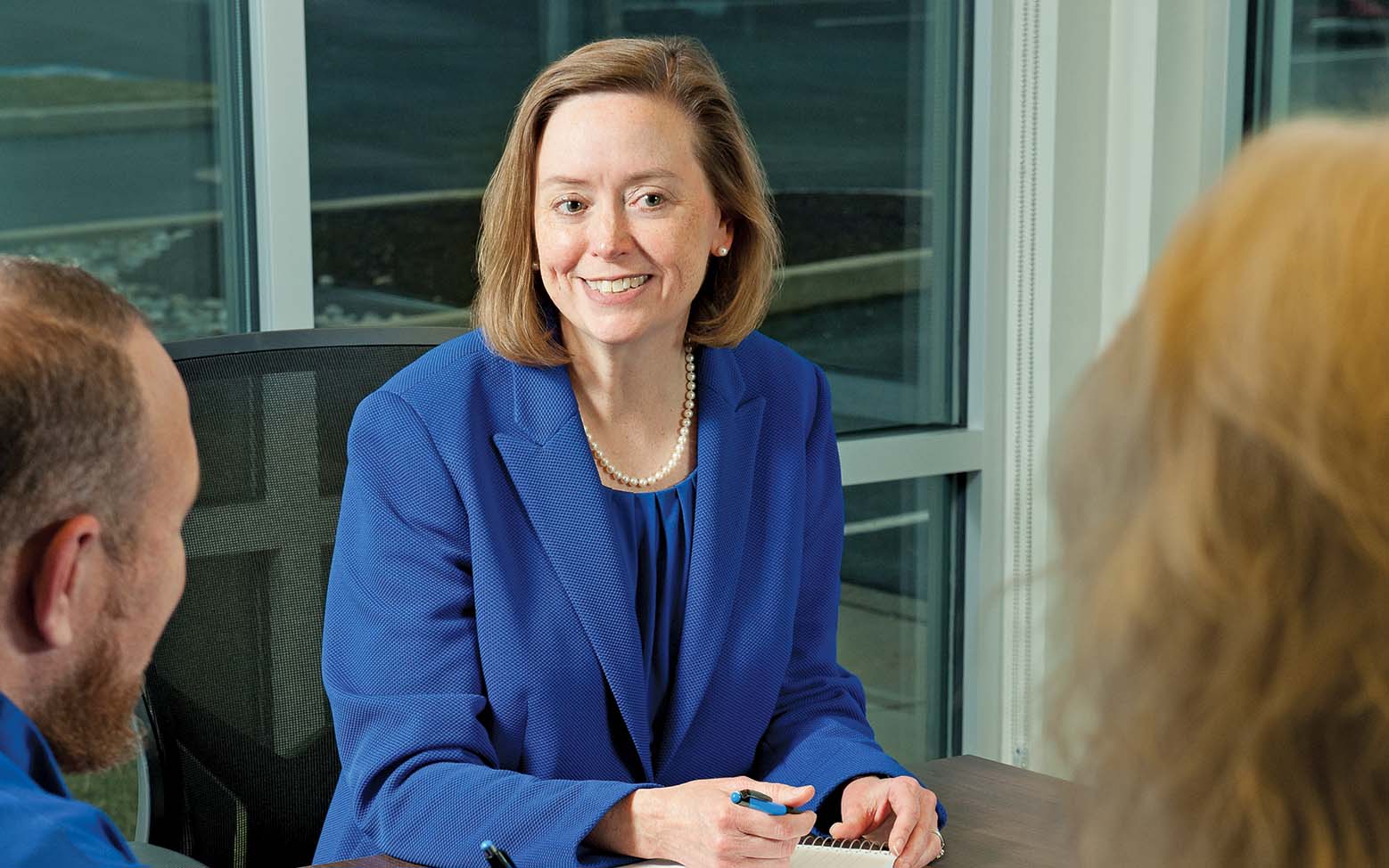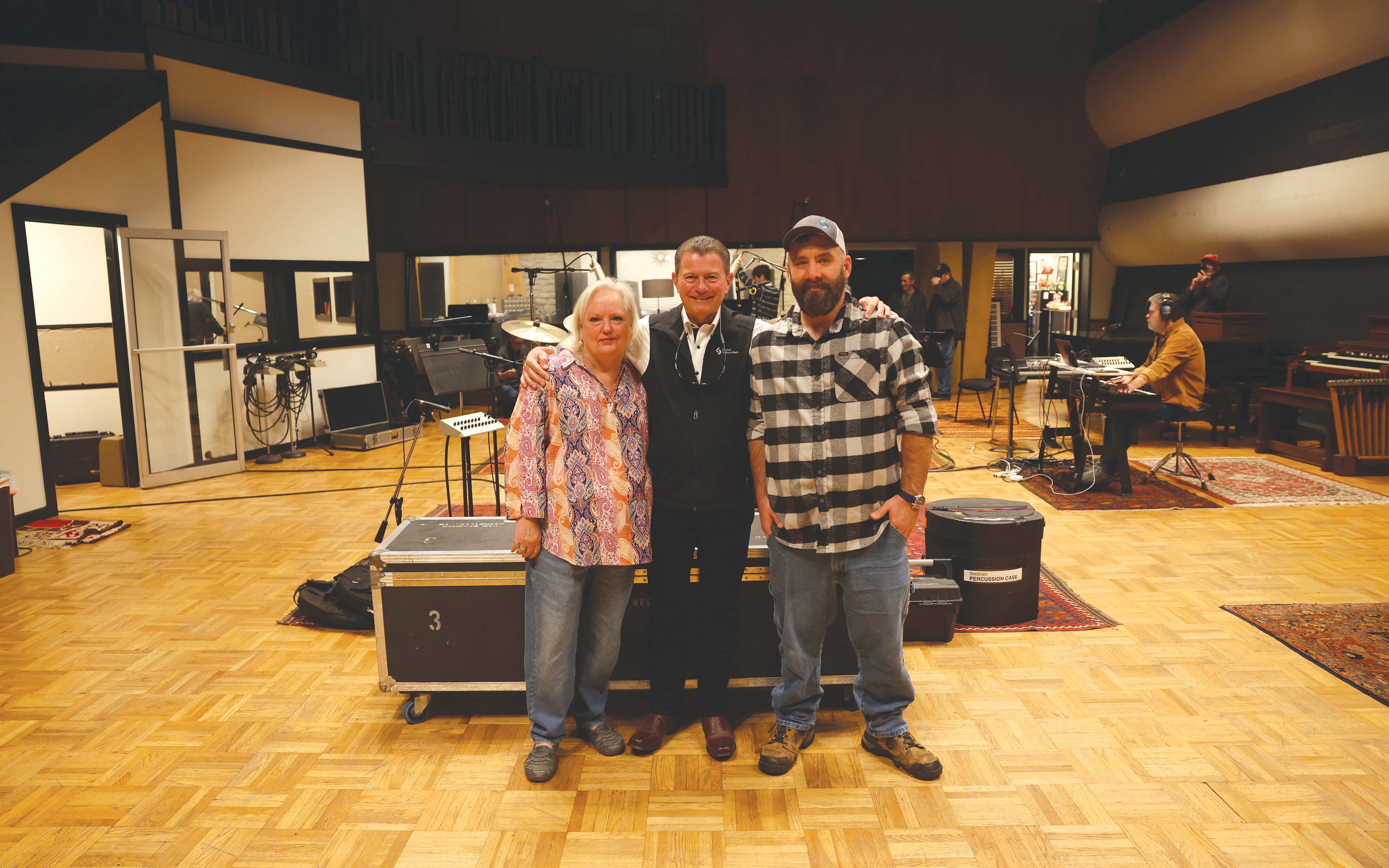Lucas White, fourth-generation family banker and president of The Fountain Trust Company in Covington, Ind., will draw on his experience of the family business and beyond as he begins his term as the 2024/25 ICBA chairman.
Meet Lucas White, 2024/25 ICBA Chairman and Fourth-Gen Community Banker
March 01, 2024 / By Tiffany Lukk
Lucas White, fourth-generation family banker and president of The Fountain Trust Company in Covington, Ind., will draw on his experience of the family business and beyond as he begins his term as the 2024/25 ICBA chairman.
To learn how incoming ICBA chairman Lucas White got his start in the community banking industry, we need to look back further than his first job in the teller line or when he saw his father go to work at the bank every day. We need to look back 121 years ago, to where it all started: with hog slop.
White’s great-grandfather, William Nelson White, and great-grandmother, Mary Emily White, were farmers. According to the family story, Mary was out slopping the hogs and got slop down her high-top, laced-up boot.
“She swore that was going to be the last hog she ever slopped, and the next day they enrolled my great-grandfather in law school over in Indianapolis,” White says. “Two years later, he became a lawyer.”
As a local attorney during the Great Depression and before the creation of the Federal Deposit Insurance Corporation (FDIC), William was responsible for, among other things, winding up approximately 12 failed banks.
“That was his first real introduction to banking,” White says. “And he did well enough during that time that he was able to start buying shares in … The Fountain Trust Company.”
Serendipitously, the community bank based in Covington, Ind., was founded the same year William started law school.
In 1937, William and his two sons joined the bank’s board and later obtained a majority of its shares, gaining ownership of The Fountain Trust Company. Today, the community bank has $670 million in assets, and Lucas White has served as its president since 2016.
Banking’s in the blood
Let’s fast-forward about 58 years to when White was a freshman in high school. Growing up, he saw his grandfather and father follow in his great-grandfather’s footsteps. Both became lawyers and eventually presidents of The Fountain Trust Company.
“I ended up working in every department in the bank. I wish we could have all employees do that, because you learn not just about whatever your specific job is, but you learn how the bank works together.”—Lucas White, The Fountain Trust Company
Starting at age 14, White spent his evenings working various roles for the bank. Then, during his time as a high school student and then an undergrad at Indiana University in the city of Bloomington, Ind., he became the bank’s jack-of-all-trades. He worked as a teller in the drive‑through line, in the data center on the night cycle, in the loan department and more.
“I ended up working in every department in the bank,” he says. “I wish we could have all employees do that, because you learn not just about whatever your specific job is, but you learn how the bank works together.”
However, White had strong ties to the legal department. Like each of Fountain Trust’s presidents before him, White also attended law school, and he obtained his JD (Juris Doctor) degree from Indiana University.
Despite the fact that multiple generations of his family had spent their careers working at The Fountain Trust Company, White was never pressured to do the same. His parents encouraged him to go to college and then go do what he wanted to—whether that was at the bank or not. But something still called him back home.
“I’ve seen the value of the bank all my life, and for whatever reason, I always knew I wanted to come back to the bank,” he says. “I would say it’s in the blood.”
As far as White’s three sons’ futures at the bank, only time will tell. “Hopefully I am good enough to encourage them to do whatever they want,” he says. “But it’d also be kind of cool if they would come back to the bank and continue the tradition.”
An international perspective
Incoming ICBA chairman Lucas White attributes the start of his career in banking to working multiple jobs at The Fountain Trust Company in high school. However, while he was working toward his professional future, he was also building a foundation for his personal and family life. While attending high school in Covington, Ind., White met his high school sweetheart, Sue, who he would marry after 10 years of dating. During that time, White has worked nearly consistently at his community bank. However, he did take a gap year between high school and college to study in Germany and Italy, which inspired him to double major in philosophy and Italian at the University of Indiana. There, he also acquired his JD. Now, White lives down the road from his parents in a house that he and his wife built. They have three sons aged 12, 10 and 5. Nowadays, White’s kids take up most of his time, he says. His sons are involved in sports, including swimming, soccer and basketball. And White himself still stays active by running, traveling, sailing—and motorcycle riding. Over 17 years and 57,000 miles, White has ridden his motorcycle in almost every U.S. state and Canadian province.
Advocating for change
White brings the lessons he has learned from The Fountain Trust Company’s previous presidents and his own experience into his position as ICBA’s next chairman—a role he’s honored to take on.
“I’ve been a community banker all of my life, and I’m not sure it gets any better than being chairman of ICBA when it comes to being a community banker,” he says.
White acknowledges that a yearlong term isn’t enough time to change the world, but if he can inspire community bankers across the country to continue pushing the industry forward, he would consider that a success.
To that end, one of his main goals for his term is to encourage and increase advocacy work for community banks.
“That would be a success—if I can just get a few more people, particularly young people, to take the time and start to get into the advocacy side,” he says. “Unless you’re the president of the bank, you show up, you do your job every day at the bank, and you don’t necessarily think about how the bank as a whole works or how community banking as a whole works. … I think advocacy is a good way to introduce people to that other side of what we’re doing.”
White’s passion for advocacy was sparked by seeing his father lobbying for community banking at the U.S. Capitol as part of what is now ICBA’s Capital Summit, although it’d be a few more years until he himself would attend meetings with legislators.
“I grew up with ICBA and going to Washington, D.C., and that was really my first introduction to what they did,” he says. “Early on, I learned that’s just something that a community banker does—or ought to do, at least.”
White’s introduction to ICBA LIVE
Upon graduating law school, White spoke to his father about wanting to get involved with both the Indiana Bankers Association and ICBA. That led to him attending ICBA LIVE 2008 in Phoenix and joining a lending committee. Around that time, he started going to D.C. twice a year—once in the spring with ICBA for the Capital Summit and once in the fall with the Indiana Bankers Association.
Reflecting on the trajectory of his career, White credits ICBA with turning what might have been a normal job into something he loves doing for a living. He says it gave him a bird’s-eye view of community banking, a perspective he might not have otherwise had.
“I have spent a lot of time over the years learning about the issues that are pending in Congress or that the regulators are writing rules on,” he says. “I think getting involved in ICBA has helped me realize that there’s more to community banking ... and we affect more than what we do just here locally.”
A Penny for your thoughts
During nearly three decades in banking, Lucas White has gleaned pieces of advice that have helped him succeed in his and his community bank’s endeavors. Ordered/Numbered - Bold numbers
“As long as you have good loans, you have a good bank.” During the Great Depression, White’s great-grandfather witnessed and learned from the failures of other banks. “That idea has carried down through the generations, and we still care quite a bit about asset quality and loan quality,” White says.
“There are two sides to every story.” Being entrenched in community banking from a young age, White has seen the importance of listening to both sides of a story before jumping to conclusions. “It honestly has saved me a few times from embarrassing myself,” he says.
“There’s a whole world out there.” From studying abroad in Italy and Germany, White expanded his horizons outside of his corner of the world. Today, he has a more informed view of the role community banks play in not just the U.S., but internationally.
Community banking’s ripple effect
White sees community banking as bigger than just the industry itself. “What community banks do across the country is wonderful, not only for the communities that [they] are in and their customers, but for their employees and the country as a whole,” he says.
The U.S. is unique in its community banking model, which greatly benefits the economy, he says. “I think our economy is more diverse and more resilient than other economies in the world, because we have more small businesses, we have more entrepreneurs, we have more startup companies, because we have so many banks around the country that are in their own communities.
“People like to talk about shopping local, and in my eyes, community banking is the quintessential example of that,” he says. “Not only does your money stay locally, but we use your money locally to help other businesses and people buy homes or cars … It’s basically recycling the money in your local community.”
It’s with a well-earned understanding of the responsibilities community banks bear that White begins his position as ICBA chairman for the 2024/25 term.
“It’s a privilege to be able to do this and represent community banks across the country,” he says.
Piping up
Among the myriad causes that The Fountain Trust Company in Covington, Ind., supports, one of the most unique may be The Fountain Trust Pipe Band. This competitive band, consisting of drummers, pipe players and more, was founded in 1999 with the goal of becoming a “center for quality piping in Indiana.” Their first competition in 2002 may have garnered comments like, “Drummers [were] not playing together at any time,” but that did not discourage the band. The Fountain Trust Pipe Band has since become one of the only bands in Indiana to be upgraded to Grade 3 of the Midwest Pipe Band Association and went to Scotland for the 2018 World Pipe Band Championships.
Subscribe now
Sign up for the Independent Banker newsletter to receive twice-monthly emails about new issues and must-read content you might have missed.
Sponsored Content
Featured Webinars
Join ICBA Community
Interested in discussing this and other topics? Network with and learn from your peers with the app designed for community bankers.
Subscribe Today
Sign up for Independent Banker eNews to receive twice-monthly emails that alert you when a new issue drops and highlight must-read content you might have missed.
News Watch Today

Join the Conversation with ICBA Community
ICBA Community is an online platform led by community bankers to foster connections, collaborations, and discussions on industry news, best practices, and regulations, while promoting networking, mentorship, and member feedback to guide future initiatives.












